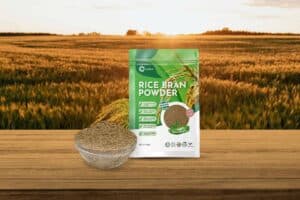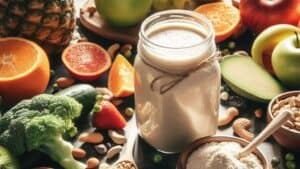Obesity is one of the evident consequences of nutrient imbalance, primarily resulting from our dietary choices. We often indulge in dishes like Nasi Lemak with fried chicken, Roti Canai with Curry Banjir, and Char Koay Teow without Tauge. While these delicacies provide us with energy, they are not rich in essential nutrients, especially fiber. Nutrition is essential for a healthy lifestyle, and understanding your daily macronutrient and fiber intake is vital for maintaining optimal well-being. In this article, we’ll delve into the world of macronutrients, including carbohydrates, proteins, fats, and fiber, exploring recommended daily intake, and discussing dietary pitfalls that can have significant health consequences.
Macronutrients:
These are the nutrients your body requires in large quantities to function well and provide energy. There are three primary macronutrients: carbohydrates, proteins, and fats. Additionally, we’ll discuss dietary fiber, which, while not a macronutrient, plays a crucial role in a healthy diet.
- Carbohydrates: Source of Energy
- Daily Requirement: Carbohydrates should make up about 45-65% of your daily caloric intake.
- Recommended Intake in Grams: For a 2,000-calorie diet, this translates to about 225-325 grams of carbohydrates per day.
Carbohydrates are your body’s primary source of energy. Sample foods rich in carbohydrates include:
- Whole grains (e.g., brown rice, whole wheat pasta)
- Fruits (e.g., apples, bananas)
- Vegetables (e.g., broccoli, sweet potatoes)
- Legumes (e.g., lentils, black beans)
- Sample meal: Quinoa salad with mixed vegetables and chickpeas.
Dietary Pitfall: Overconsumption of refined carbohydrates (e.g., sugary snacks, white bread) can lead to weight gain, blood sugar spikes, and an increased risk of type 2 diabetes.
- Proteins: The Body’s Building Blocks
- Daily Requirement: Protein should make up about 10-35% of your daily caloric intake.
- Recommended Intake in Grams: For a 2,000-calorie diet, this means consuming approximately 50-175 grams of protein per day.
Proteins are crucial for building and repairing tissues, producing enzymes and hormones, and supporting the immune system. Sample foods rich in protein include:
- Lean meats (e.g., chicken breast, turkey)
- Fish (e.g., salmon, cod)
- Eggs
- Dairy products (e.g., Greek yogurt, cottage cheese)
- Plant-based sources (e.g., tofu, tempeh)
- Sample meal: Grilled chicken breast with quinoa and steamed broccoli.
Dietary Pitfall: Excessive protein intake can strain the kidneys and may lead to dehydration. It can also be associated with a higher intake of saturated fats if primarily sourced from red meats.
- Fats: More Than Just Energy
- Daily Requirement: Fats should comprise about 20-35% of your daily caloric intake.
- Recommended Intake in Grams: For a 2,000-calorie diet, this equates to roughly 44-77 grams of fats per day.
Fats are essential for energy storage, cell membrane structure, and the absorption of fat-soluble vitamins (A, D, E, and K). Healthy fat sources include:
- Avocados
- Nuts (e.g., almonds, walnuts)
- Seeds (e.g., chia seeds, flaxseeds)
- Olive oil
- Fatty fish (e.g., salmon, sardines)
- Sample snack: Greek yogurt with mixed berries and a sprinkle of chopped almonds.
Dietary Pitfall: Consuming excessive saturated and trans fats (often found in processed and fried foods) can increase the risk of heart disease and obesity.
- Dietary Fiber: The Digestive Agent
- Daily Requirement: While not a macronutrient, dietary fiber is essential. The recommended intake typically varies and falls within 25-38 grams per day for adults. MyHealth KKM suggest for a daily intakes of 20-30grams.
- Recommended Intake in Grams: Aim to consume at least 25 grams of fiber daily for women and 38 grams for men.
Dietary fiber, is a type of carbohydrate, not digested like traditional carbs. Instead, it promotes digestive health, helps control appetite, stabilizes blood sugar, and supports heart health. Sample foods rich in dietary fiber include:
- Whole grains (e.g., oatmeal, quinoa)
- Fruits (e.g., berries, oranges)
- Vegetables (e.g., broccoli, kale)
- Legumes (e.g., black beans, lentils)
- Nuts and seeds (e.g., almonds, chia seeds)
- Sample breakfast: Overnight oats with sliced banana and chia seeds.
Dietary Pitfall: A lack of dietary fiber can lead to constipation, digestive issues, and an increased risk of chronic diseases such as heart disease and type 2 diabetes.
Lifestyle and Diet Challenges
Our modern lifestyle and dietary choices have led to several challenges and health issues:
- Processed Foods: Convenience foods often contain excessive refined sugars, unhealthy fats, and fewer nutrients, contributing to obesity and chronic diseases.
- Sedentary Lifestyle: A lack of physical activity has been linked to obesity, heart disease, and a higher risk of various health problems.
- Overeating: Frequent overconsumption of high-calorie foods can lead to obesity and related health issues.
- Lack of Diversity: A diet lacking in a variety of foods may result in nutrient deficiencies.
- Underconsumption of Fruits and Vegetables: Many people do not meet their recommended daily intake of fruits and vegetables, which are rich in essential vitamins, minerals, and fiber.
Understanding your daily macronutrient and fiber requirements is fundamental to maintaining your health and well-being. Whether you aim to boost energy levels, support your immune system, or achieve your ideal weight, a balanced diet that meets your specific needs is key.
By managing your macronutrient and fiber daily intakes, and being mindful of dietary pitfalls, you’re on the path to a healthier, better life.
References:
- “Dietary Guidelines for Americans 2020-2025.” U.S. Department of Agriculture (USDA) and U.S. Department of Health and Human Services (HHS).
- “Dietary Reference Intakes (DRIs): Recommended Dietary Allowances and Adequate Intakes, Total Water and Macronutrients.” National Institutes of Health (NIH).
- “Dietary Fiber.” Harvard T.H. Chan School of Public Health.
- Portal Rasmi MyHEALTH Kementerian Kesihatan Malaysia



